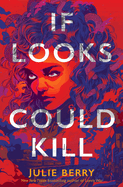
Printz Honor author Julie Berry proved her skill at high-concept historical fiction with mythological elements in her 2019 novel, Lovely War. She ups the ante with If Looks Could Kill, which ponders what might have happened if Jack the Ripper had encountered Medusa.
It's 1888, and Francis Twomblety--a real Ripper suspect, as Berry's copious back matter reveals--has fled London for New York City's Bowery neighborhood. Also recently arrived to the neighborhood are Tabitha Woodward and Pearl Davenport, recruits to the Salvation Army trying to bring the Bowery's "sinners" to Christ. The two rarely see eye-to-eye; "not for nothing are we called an army," Tabitha reflects on the "open hostilities" between herself and her intensely pious roommate. But a chance encounter with Twomblety transforms Pearl, giving her Medusa-esque characteristics: snakes for hair, an incapacitating if not deadly stare, and an inexplicable drive to stop Twomblety from hurting anyone else. Tabitha realizes she must protect her exasperating comrade, "this new Pearl," against a killer, lest he prove a match even for a Medusa.
If Looks Could Kill drips with the historical and sensory detail Berry's readers have come to expect from her work, as when Tabitha describes "the mélange of corned beef, garlic, chop suey, horse manure, and stale beer that meant suppertime on the Bowery." Some readers might take issue with the first act's pacing, but it's necessary for Berry to lay the groundwork for the novel's most essential component: the relationship between Tabitha and Pearl. At this, she succeeds with aplomb, and the rest of the novel is better for it, offering a meticulously thoughtful exploration of vengeance, justice, mercy, faith, and sssisterhood. --Stephanie Appell, freelance reviewer

